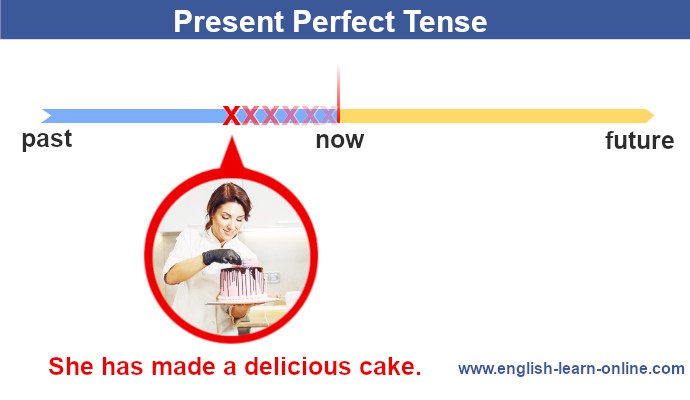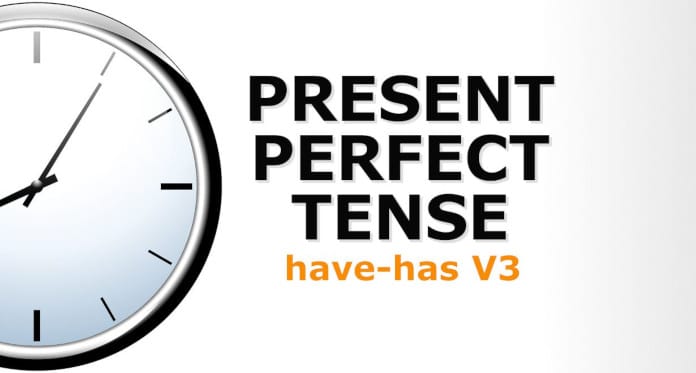Present perfect tense is one of the commonly used verb tenses in English. It describes unfinished actions, experiences or actions without a definite time in the past. We use present perfect tense without a definite time expression such as “last week”, “two days ago” or “in 2018”. Instead of these we use “just”, “already”, “yet” etc. The auxiliary verbs of present perfect tense are “have” and “has“. The verbs are always in the past participle form.
Table of Contents
- ⬤ Formation of present perfect tense
- ⬤ Positive (Affirmative) sentences
- ⬤ Negative sentences
- ⬤ Interrogative sentences
- ⬤ Sentence forms in present perfect tense
- ⬤ Explanations and usages of present perfect tense
- ⬤ Learn “since, for, already, yet, just etc” with memory cards.
- ⬤ Pictures and related example sentences
- ⬤ A dialogue for present perfect tense
- ⬤ Sentence translation activity
- ⬤ Sentence scramble activity
- ⬤ Example sentences about present perfect tense
- ⬤ Questions and answers
⬤ Formation of present perfect tense
To make positive (affirmative) sentences we use the formation of “have/has” + Past participle verb”. For negative sentences we use “not” after the auxiliary verbs “have” and “has”. The short forms are “hasn’t” and “haven’t“. You can use “‘s” and “‘ve” as short form of “has” and “have”.
Maria
the T-shirt

⬤ Positive (Affirmative) sentences
- I have lost my pen.
- They have watched TV.
- Frank has hurt his leg.
- My friends have gone to İstanbul.
⬤ Negative sentences
- I haven’t met him before.
- Oliver hasn’t listened to the teacher.
- He hasn’t phoned me.
- It hasn’t rained so far.
⬤ Interrogative sentences
- Have you seen that film before?
- Has he booked a hotel room?
- Where have you been?
- Why have you called the police?
⬤ Sentence forms in present perfect tense
| (+) Affirmative sentences | (-) Negative sentences | (?) Interrogative sentences |
|---|---|---|
| I have lost. | I have not lost. | Have I lost? |
| You have lost. | You have not lost. | Have you lost? |
| He has lost. | He has not lost. | Has he lost? |
| She has lost. | She has not lost. | Has she lost? |
| It has lost. | It has not lost. | Has it lost? |
| We have lost. | We have not lost. | Have we lost? |
| They have lost. | They have not lost. | Have they lost? |
SIMILAR PAGES:
❯❯ Learn verb to be here
❯❯ Learn simple present tense here
❯❯ Learn present continuous tense here
❯❯ Learn future simple tense (will) here
❯❯ Learn be going to future tense here
❯❯ Learn simple past tense here
❯❯ Learn past continuous tense here
⬤ Explanations and usages of present perfect tense
The explanations and usages of present perfect tense are below.
⬤ Usage 1- Unspecified Time
We can use the present perfect tense to talk about actions with unspecified time before now. You can use “ever, never, already, yet, before, once, so far, many times etc.” However we don’t use “yesterday, last week, 2 years ago, in 2006” because these are specific times unlike the ones above.
- I have just finished my homework.
- We haven’t talked about the new year yet.
- The bus has already arrived.
⬤ Usage 2- Experiences
We can also use the present perfect tense to talk about our experiences. Remember that if you want to use a specific time with your experience, use simple past tense.
We use “ever”, “never”, “before”, “been to” to talk about experiences. You can use “Have you ever” to ask experiences.
- I have visited Bosphorus before.
- We have watched that film before.
- I haven’t eaten sushi yet.
- She has never been to England.
- Have you ever seen a car accident?
⬤ Usage 3- Finished action with a present result
We can also use the present perfect tense to say that there is a result because of a recent action in the past.
- I have washed my car.
- He has had a haircut.
- Mark has lost his bicycle.
⬤ Usage 4- Unfinished Actions
Present perfect tense is also used to talk about unfinished actions that is true up to the present. “Since, for, how long” are the common expressions to use for this usage.
- I’ve worked in this company for 6 years.
- They have lived in this city since 2012.
- We have been friends for years.
⬤ Usage 5- Change Over Time
We can use the present perfect to talk about actions that continuously happen over time.
⬤ Learn “since, for, already, yet, just etc” with memory cards.
Click on the cards and say the meaning of them in your native language.
Here are some pictures that will help you learn present perfect tense.
⬤ A dialogue for present perfect tense
Here is a dialogue to learn present perfect tense. You can make similar dialogues.
-
Hi Sally!
I’ve heard that you are getting married next month.
-
Yes. That is true.
I’m very excited.
I’ve never been so excited in my life!
-
Is everything ready?
-
Yes, we have finished most of the preparations.
-
I am happy to hear that. You can call me for help at any time.
-
Thank you.
⬤ Sentence translation activity
Here you can see some examples of present perfect tense. Try to translate the sentences on the cards into your own language.
⬤ Sentence scramble activity
Play sentence scramble activity here to practice present perfect tense. Click on the words of the sentences in the correct order to complete the sentences.
⬤ Example sentences about present perfect tense
These are 10 sentences to learn present perfect tense.
➔ 10 examples of present perfect tense
- I have searched for it many times.
- Isabel has already fed the dog.
- She has missed the bus.
- He has studyed English for 2 years.
- Michelle has just left a message for you.
- Margaret has been a student here since March.
- I have forgotten my room number.
- I think we’ve lost our way.
- I haven’t watched that film before.
- Adam has been a dentist for 7 years.
⬤ Questions and answers
You can read the questions and the answers here to learn the formation of affirmative and interrogative forms of present perfect tense.
➔ 10 questions and answers about present perfect tense
- How long have you been here?
I have been here for 4 years. - Have you eaten raw meat before?
Oh! No. I have never eaten. - Where have you been?
I have been with my classmates. - Have ever you touched a snake with your bare hands?
No, I haven’t touched it in my whole life. - Where has she gone?
She has gone to a nearby market. - Have you sent the letters yet?
Sure. I have already sent them. - Have you washed your hands?
Yes, I have. - Has anybody seen my glasses?
Yes. They were on your book. - How many books have you read this month?
I have read 6 books. - Which song have you learnt to play recently?
“Have You Ever Seen The Rain?”
➔ Reading passage
Since 1980s, technology has changed a lot. The first computers were very simple and they didn’t have much capability. They didn’t have much memory. They were not powerful devices. They had small screens, too. Early computers were also very expensive. Now computers have become very powerful with strong memory cards and CPUs. Programmers have designed many useful software. Internet has been an important part of our lives. Thanks to computers and Internet we have had access to a great deal of information online.
External resources:
This is a pdf document as a worksheet about present perfect tense


